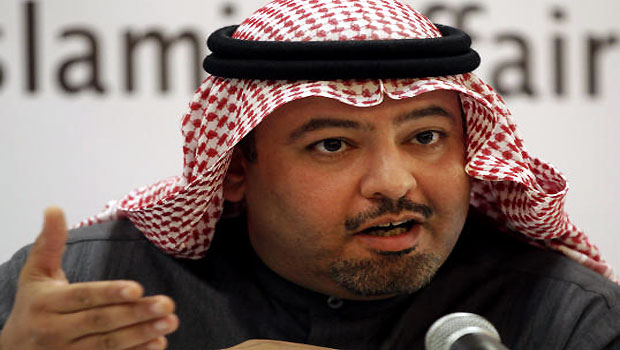
Bahrain’s Justice Minister, Khalid Al Khalifa, speaks during a press conference in Manama, Bahrain. (AP)
Speaking exclusively to Asharq Al-Awsat, Sheikh Khalid—who is a leading member of the ministerial team representing the government at the national dialogue—said: “The dialogue will continue; it will not stop until its objectives are achieved.” He added that the excuses given by the five opposition groups for suspending their participation in the dialogue sessions were unacceptable and akin to political extortion.
“Returning to dialogue is the only way for Bahrainis to overcome the current crisis and its numerous complications,” he said.
The five groups that make up the National Democratic Opposition Parties suspended their participation in the national dialogue in September following the arrest of leading Wefaq opposition figure Khalil Al-Marzouq on charges of inciting terrorism.
Sheikh Khalid told Asharq Al-Awsat that “a consultation session was held last week between participants in the dialogue, which was not attended by the five opposition groups who suspended their participation.” He said that the meeting discussed the message sent by the opposition to the Justice Minister on September 18, which announced the suspension of their participation and called for the release of all those held on terrorism charges. However, the Bahraini Justice Minister said that the participants cannot agree to the opposition’s demands, adding that the constitution must be respected.
The Minister said: “The three parties taking part in the recent consultation meeting pointed out that the security of the country and its people are not up for negotiation,” and that “the recent escalation in terrorism in the Kingdom resulted in a meeting of the National Council on July 28, which made a number of important recommendations on confronting terrorism. These terrorist threats, however, were not condemned by the five opposition groups, despite the threat they pose to national security, and to political and social stability. They [the opposition] did not take a clear and firm stance regarding these acts of terror.”
He added, “What is needed–instead of adopting a negative attitude by suspending their participation in the dialogue–is for the opposition to demonstrate a clear stance towards this terrorist threat, and to announce an unequivocal condemnation which is equal to the public resolve as embodied by the National Council regarding terrorist violence. Instead of suspending their participation in the dialogue, they should have supported the government’s judicial measures against the incitement of terrorism and open support for this phenomenon.”
“This includes what happened during an event held by one of the opposition groups, in which an opposition leader blatantly announced support for a terrorist organization, a fact that is documented and in the public domain. That will not be ignored, because it is a blatant violation of the law,” Sheikh Khalid told Asharq Al-Awsat.
As for the four points of national concession agreed prior to the national dialogue, which began in 2012, the Sheikh Khalid summed them up as following:
“First, dialogue is the only way for participants to resolve political problems and to rationalize the conflicts and arguments that keep the crisis going. The [opposition’s] constant suspension of their participation is unfair on the participants, and political blackmail is not acceptable,” he said
“Second, one of the obvious ploys is the excuse used to suspend participation . . . as if what was required was the immediate automatic acceptance of all visions and proposals, not achieving consensus on them, and not having discussed them. This would mean that the dialogue loses its purpose and viability, because it would turn into a body merely imposing conditions on others,” he added.
“Therefore, it is imperative to stress the importance of accepting the logic of dialogue, its mechanisms and its aims. . . . Dialogue depends on national consensus and is not tied to conditions, and no real or serious progress can be made outside of a consensus,” the minister said.
As for the third point of consensus, the Justice Minister said this was “the agreement on rejecting rebellion against state institutions and the constant casting of doubt about them and rejecting the distrust of the judiciary—because the principles of the sovereignty of law and independence of the judiciary cannot be compromised—in addition to confirming that no one is above the law, regardless of their religious or political position.”
“These are the most important principles on which a civil state is built—a state of law and institutions. The adherence to the state of law means ending demands not to enforce laws,” he added.
Regarding the fourth point of consensus, Sheikh Khaled turned his attention to the five opposition groups and their boycotting of the dialogue. “The excuses used by the five opposition groups regarding what they term ‘prisoners of conscience’ to suspend their participation in the dialogue is totally rejected, because it is based on a misunderstanding. There are no prisoners of conscience in Bahrain today, only people who have been convicted of committing crimes according to law—unless these groups consider breaking the law to be a form of opinion,” he said.
Sheikh Khalid told Asharq Al-Awsat: “There is no alternative to the dialogue table to discuss all political issues that concern the state and its citizens. The suspension of participation contributes to increasing the tension and delaying the opportunities for a solution. That is why the dialogue will continue until the five [opposition] groups join.”
Sheikh Khalid added, “The five groups must clearly declare their respect for the constitution and the law, and for the state of law, and their clear and unequivocal rejection of all forms of violence and the violation of the authority of the law, disowning all violent and terrorist acts which are carried out daily by lawless groups without any open condemnation.”
